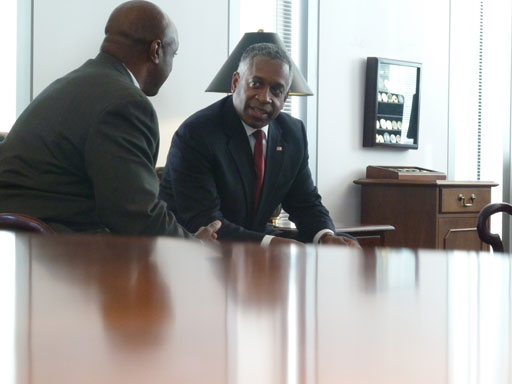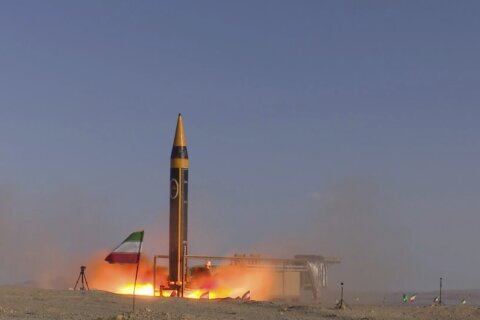



J.J. Green, wtop.com
WASHINGTON – Seated at a large conference room table, B. Todd Jones, interim director of the Bureau of Alcohol, Tobacco, Firearms and Explosives, is multi-tasking. He stares intently at an iPad and taps lightly on the glowing screen while describing his troubled agency.
But the scope of his multi-tasking abilities extends far beyond that room. In addition to his assignment at ATF, he is the U.S. Attorney in Minnesota.
“I’ve been able to build a pretty good team there. I do have very good deputies, and I think we work collaboratively and things are appropriately delegated. Technology is also a wonderful tool. I have regular VTC (video teleconference) calls,” Jones says with a wide smile.
He spends 80 percent of his time in Washington because he recognizes what’s at stake as investigators dig into the ill-conceived “Operation Fast and Furious,” a sting run by ATF’s Phoenix Field Division between 2009 and 2010.
During the operation, ATF facilitated the sale of more than 2,000 guns in order to investigate alleged connections between U.S. gun purchases and violent crime in Mexico. Approximately 200 weapons were traced to crime scenes in Mexico.
But on Dec. 14, 2010, any success that the operation might have claimed evaporated shortly after U.S. Border Patrol Agent Brian Terry was killed. His death was linked to weapons allowed into Mexico.
On Feb. 15, U.S. Immigration and Customs Enforcement agent Jaime Zapata was shot to death by Mexican drug cartel members in northern Mexico. Federal investigators traced the gun used to kill Zapata to a Dallas-area man.
“The general assessment right now, and I don’t think anybody disputes it, is that there were mistakes made, that there were some lapses in judgment in investigatory tactics, and there were some poor decisions made that I think will be reflected in great detail when the I.G. (Inspector General’s) report comes out,” Jones says.
His wide smile fades away and with a serious and focused look, he shifts in his chair and glances over at one of his key aides as he talks about “Fast and Furious.”
He is cautious to avoid saying too much about the case.
“Really because of that internal review we aren’t in a position to share with the public generally,” Jones says.
But he reveals, “There is a lot of misinformation out there.”
Legally prohibited from going into detail, he is quick to say, however, that misinformation has made life tough for many hard-working ATF agents.
“It sometimes creates a sense of apprehension and uncertainty within a major and critical law enforcement agency,” Jones says.
The House Judiciary Committee is expected to do little to change that as it grills Attorney General Eric Holder Dec. 8 about the operation.
But Jones, a former U.S. Marine, is used to fights. In a move that some find surprising, he actually volunteered to take the reins of the beleaguered agency.
When questioned about what led him to jump into the ongoing firestorm, he says, “I have a lot of experience with federal law enforcement agencies and I have a lot of experience with ATF, from a prosecutor and practitioner’s stand point.”
“I know the work that they have done over the last 20 years during my time with the Department of Justice. It’s an outstanding organization that does great work on the violent crime front.”
In the next article: Restoring ATF’s reputation.
Follow J.J. and WTOP on Twitter.
(Copyright 2011 by WTOP. All Rights Reserved.)







